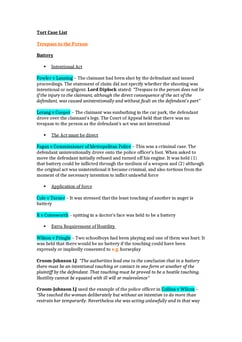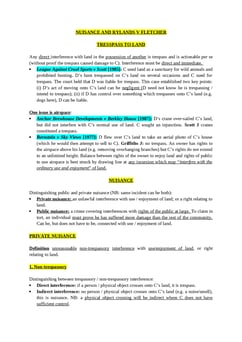James-Bowen v Commissioner of Police of the Metropolis [2018] UKSC 40
By Oxbridge Law TeamUpdated 04/01/2024 07:17
Reviewed ByOxbridge Law Team
Judgement for the case James-Bowen v Commissioner of Police of the Metropolis
Table Of Contents
KEY POINTS
- The common law typically does not acknowledge a duty of care within the tort of negligence to ensure the protection of reputational interests. However, an employer who provides a reference for a former employee has a duty to exercise reasonable care in its preparation. If the employer breaches this duty and the employee suffers economic loss as a result, the employer can be held liable for negligence.
- Citing Calveley v Chief Constable of the Merseyside Police, a Chief Constable does not have a duty to his officers regarding how he defends a claim brought against him by a third party. The Chief Constable's role in such a claim is primarily to respond to allegations made by the third party.
- The interests of an employer, who is being sued based on vicarious liability for the wrongful actions of their employees, are fundamentally different from the interests of the employees themselves. As such, given the significant disparities in the interests of employers and employees, it would be unjust and unreasonable to impose a duty of care on employers to defend legal proceedings in order to safeguard the economic or reputational interests of their employees.
- While the relationship between the Commissioner and the officers can be likened to that of employer and employees, it lacks the characteristics of other relationships, such as those between a company and its shareholders, among others. Consequently, there is no basis or justification for granting the officers access to legally privileged material.
FACTS
- Four police officers, employed by the Metropolitan Police Service, were involved in the arrest of a suspected terrorist known as BA. BA later accused the officers of assaulting and causing serious injuries during the arrest.
- BA initiated civil proceedings against the Commissioner, arguing that the Commissioner should be held vicariously liable for the alleged assault committed by the officers. Eventually, the claim was resolved through a settlement, with the Commissioner admitting liability and offering an apology for the "gratuitous violence" inflicted on BA by the officers.
- The officers contend that a press release issued by the Commissioner following the trial implied their culpability.
- Subsequently, the officers initiated legal proceedings against the Commissioner, their employer or quasi-employer, seeking compensation for damages related to their reputation, economic losses, and psychiatric harm.
- The central issue is whether a duty of care is owed by an employer to its employees to conduct litigation in a manner which protects them from economic or reputational harm.
COMMENTARY
- This case sheds light on the duty of care owed by an employer or quasi-employer to police officers in relation to statements made following settled civil claims. It establishes the requirements for liability and underscores the importance of objective interpretation and context in assessing potential harm caused by such statements.
Any comments or edits about this case? Get in touch
For Further Study on James-Bowen v Commissioner of Police of the Metropolis
Need instant answers? Our AI exam tutor is here to help.
Ask questions 🙋 Get answers 📔 It's simple 👁️👄👁️
Our AI is educated by the highest scoring students across all subjects and schools. Join hundreds of your peers today.
Get StartedSimilar Cases
Related Product Samples
These product samples contain the same concepts we cover in this case.
| GDL Tort Law | Employer's Liability Notes (10 pages) |


 Since 2010, Oxbridge Notes has been a trusted education marketplace, supplying high-quality materials from top achievers at universities like Oxford, Cambridge, LSE, Harvard, and Yale.
Since 2010, Oxbridge Notes has been a trusted education marketplace, supplying high-quality materials from top achievers at universities like Oxford, Cambridge, LSE, Harvard, and Yale.